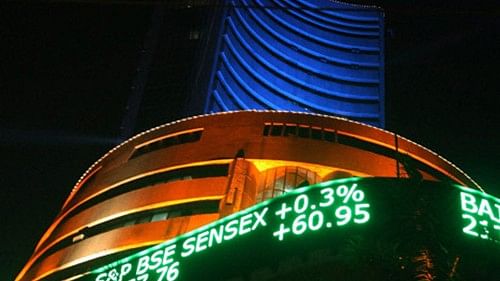
The NSE plans to launch options contracts based on key sectoral indices.
Credit: PTI File Photo
Mumbai: India’s top stock exchanges are luring investors with new products and lower fees as they battle for a share of the hot but fledgling derivatives market, in turn fuelling a surge in trading activity that is drawing regulatory scrutiny.
The larger National Stock Exchange of India and its older rival BSE are wrestling for dominance in derivatives, particularly the raging options market spurred by the introduction last year of short-term contracts that can be traded with borrowed funds.
The monthly notional value of derivatives traded on Indian exchanges exploded to an eye-popping 8,737 trillion rupees ($104.65 trillion) in March 2024, more than double that of a year earlier, data from the regulator shows.
The NSE plans to launch options contracts based on key sectoral indices, including the pharmaceutical and IT indices, if it gets the regulatory go-ahead, according to two exchange sources.
In April, it launched option contracts on a Nifty Next 50 index of the 50 largest stocks which are not in the benchmark Nifty index.
It has reduced transaction fees and a wider review to further reduce charges is underway, said the sources, declining to be identified as they are not authorised to speak to the media.
Not to be left behind, the BSE plans to launch options contracts based on indices of the top 50 and top 100 companies by market value, a source familiar with the exchange's plans said, also declining to be identified.
The exchange will launch "complementary products" and "relaunch languishing products", Sundararaman Ramamurthy, chief executive of BSE told Reuters, without elaborating.
"We do not consider ourselves in competition with NSE," Ramamurthy said. "They have been very large for the last 23 years and we have just started getting traction."
Details of the new products planned by the two exchanges have not been previously reported.
BSE’s aggressive strategy has pushed up its market share in derivatives trading from less than one percent to 17 per cent in the twelve months ending March 2024, denting NSE's near monopoly on derivatives trading in India.
Options volumes have rocketed as well. Of the 108 billion options contracts traded worldwide in 2023, 78 per cent were on Indian exchanges, according to data from the Futures Industry Association.
Both exchanges have seen revenues rise, with the BSE reporting a 55 per cent increase in the nine months ending December 2023 and NSE a 21 per cent increase. For NSE, 80 per cent of its revenue comes from transaction charges, for BSE it is 38 per cent as per exchange disclosures.
The competition has caught the attention of market regulator, the Securities and Exchange Board of India (Sebi).
Earlier this week, Sebi asked the exchanges to pay higher regulatory fees based on the notional value of derivatives traded, after which BSE raised its transaction fees.
Sebi is also scrutinising the incentives given by exchanges to brokers, two regulatory sources told Reuters. The regulator is probing the practise of charging lower transaction fees for brokers with high turnover, the sources said.
Sebi has not so far responded to a Reuters request for comments. An NSE spokesperson did not respond to an email seeking comment.
Derivatives boom, risks rise
The value of derivatives traded in India in 2023 was 421 times traditional cash trading - the highest among major global markets, Axis Mutual Fund said in a report last year.
“An options contract expiring daily has definitely bumped up options trading in India," said Nithin Kamath, chief executive and co-founder, Zerodha, India's largest broking firm.
Retail investors now make up 35 per cent of derivative trading in the country, prompting the regulator to issue repeated warnings on the risks of such trading. Indian regulators will form a panel to study the risk posed by the derivative trading surge, Reuters reported last month.
Options expiring on the same day, known in technical parlance as 'zero day to expiry' options, are particularly popular among retail investors.
For Cusrow Sadri, 51, the wide variety of options and daily contract expiries introduced by exchanges over the past year has meant an opportunity to make higher returns.
"I made a profit of 30 per cent on my capital last year," said Sadri, who quit his job in the airline industry satisfied with his "good" earnings via options selling.
Siddharth Joshi, a 36-year old from Surat in western India, gets the opportunity to trade more because of the shorter term expiries, he said.
"The multiple expiries have helped in making a neat profit," said Joshi whose average trade is around Rs 50,000 ($599.11).
According to a Sebi study of January 2023, nine out of ten investors made losses while trading in derivatives.
Nudged by Sebi, both BSE and NSE have launched investor awareness campaigns and issued warnings on risks associated with trading in options.
But BSE's Ramamurthy said exchanges cannot be held responsible.
"Exchanges do not decide the participants, it is the market which decides," Ramamurthy said. "We can only take steps to reduce risks posed by the rise of retail option traders."
The two exchanges have now shifted focus to wooing institutional investors, including foreign ones.
The BSE is holding regular meetings and roadshows with domestic brokers and foreign institutions, and offering more co-location racks which allow traders to locate their servers in the exchange premises for faster access to data and exchange systems, Ramamurthy said.